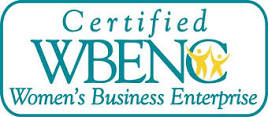Facial Authentication vs. Facial Recognition: Understanding the Differences and Applications
By Gina Stuelke, CEO of Kenton Brothers
 Biometric technologies have gained immense popularity for their convenience and enhanced security. Among these technologies, facial authentication and facial recognition stand out as two of the most discussed and applied innovations. While the terms are often used interchangeably, they refer to distinct processes and serve different purposes.
Biometric technologies have gained immense popularity for their convenience and enhanced security. Among these technologies, facial authentication and facial recognition stand out as two of the most discussed and applied innovations. While the terms are often used interchangeably, they refer to distinct processes and serve different purposes.
In this blog post, we’ll break down the differences between facial authentication and facial recognition, their underlying technology, and their real-world applications.
What is Facial Authentication?
Facial authentication is a biometric verification process where a system compares the face of a user to a pre-stored image (or template) to confirm their identity. This technology is primarily used in situations where a user must prove they are who they claim to be, such as when unlocking a smartphone, accessing a secure area, or logging into a banking app.
How it Works:
- Enrollment: The user enrolls their face into the system by scanning it, typically with a camera. This creates a template, which is a mathematical model of the facial features.
- Comparison: When the user attempts to access the system again, their face is scanned in real-time and compared to the stored template.
- Matching: If the live scan and stored template match within a certain threshold, the user is authenticated.
Key Features:
- One-to-One Comparison: It compares a user’s face against their own stored template, confirming their identity.
- Security: It is typically used in secure environments where users need to prove their identity (e.g., smartphones, banking apps).
- User Control: Users usually initiate the process and consent to the comparison.
- Common Applications:
- Smartphone unlocking (e.g., Apple’s Face ID)
- Secure access to apps and services (e.g., banking apps)
- Physical security systems (e.g., building access)
What is Facial Recognition?
Facial recognition is a broader technology used to identify or verify a person from an image or video in a database or a public setting. Unlike facial authentication, facial recognition often works without the active involvement or consent of the individual and can be used in surveillance or identification tasks.
How it Works:
- Image Capture: A camera or video feed captures the face of a person in real-time or from a photograph.
- Feature Extraction: The system extracts facial features from the image and creates a biometric template.
- Database Search: The system compares the facial features to those in a large database to find a match.
- Identification or Verification: If a match is found, the person is identified or their identity is verified. If no match is found, they remain unidentified.
Key Features:
- One-to-Many Comparison: Facial recognition systems compare a person’s face against many stored templates in a database.
- Surveillance and Public Use: It’s often used in public spaces for surveillance, identifying individuals without their active participation.
- Privacy Concerns: Since individuals may not know when their face is being scanned, the technology has raised privacy and ethical concerns.
- Common Applications:
- Law enforcement and criminal identification
- Airport security and border control
- Retail and commercial surveillance
- Marketing and customer analytics (e.g., identifying returning customers)
Key Differences Between Facial Authentication and Facial Recognition
Facial Authentication
Purpose: To verify an individual’s identity
Comparison Type: One-to-one comparison (individual vs. stored template)
User involvement: Requires user participation
Security vs. Convenience: Primarily for security (e.g. unlocking devices)
Privacy concerns: Lower (user initiates the scam)
Common User Cases: Smartphone authentication, banking apps Law enforcement, public surveillance, marketing
Facial Recognition
Purpose: To identify or recognize individuals in a crowd
Comparison Type: One to many comparison (individual vs. database)
User involvement: Can be passive and without user consent
Security vs. Convenience: Primarily for identification tracking
Privacy concerns: Higher (can be used without user consent)
Common User Cases: Law enforcement, public surveillance, marketing
Privacy and Ethical Considerations
While both technologies offer undeniable benefits, they raise important privacy concerns, particularly facial recognition. Since facial recognition can be used without the knowledge or consent of the individual, it poses potential risks related to surveillance and the tracking of individuals in public spaces. Many governments and organizations are still working to strike a balance between the benefits of these technologies and the protection of individual privacy. On the other hand, facial authentication, which requires user consent and involvement, is generally considered less invasive, as it is used for secure access to personal devices or services.
Facial authentication and facial recognition are two powerful biometric technologies with distinct purposes and applications. Facial authentication is typically used to verify a user’s identity for security purposes, while facial recognition is used to identify individuals from a crowd or a database. Understanding these differences is crucial, especially as both technologies continue to evolve and become more integrated into our daily lives.
Whether you’re concerned about privacy, security, or convenience, it’s essential to stay informed about how these technologies are being used and regulated. We are here to guide you, give us a call.

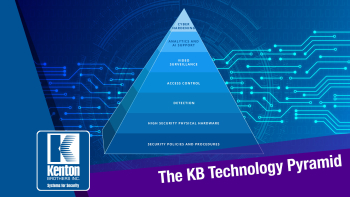
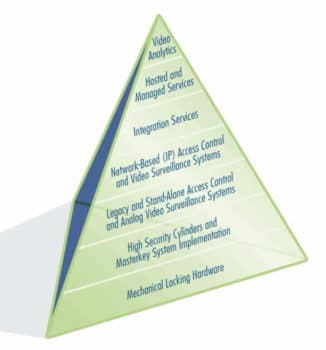
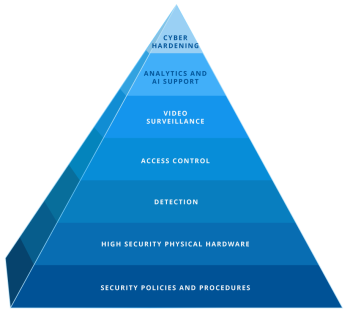
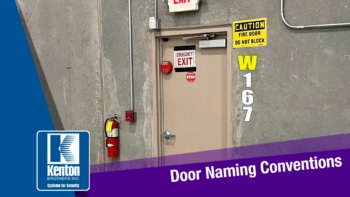 One of the most critical aspects of planning a commercial security system design for a facility is organization. Taking the time to get the details right ensures that all users of the system easily understand how the various components and functions will work together. One of the topics that can cause a lot of confusion is how to verbally reference a specific door inside your building(s).
One of the most critical aspects of planning a commercial security system design for a facility is organization. Taking the time to get the details right ensures that all users of the system easily understand how the various components and functions will work together. One of the topics that can cause a lot of confusion is how to verbally reference a specific door inside your building(s).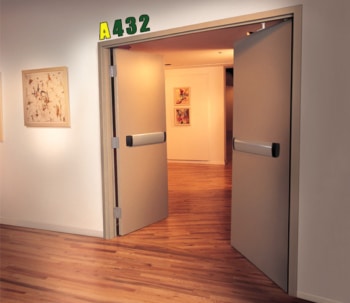 I sat down with one of our employees,
I sat down with one of our employees, 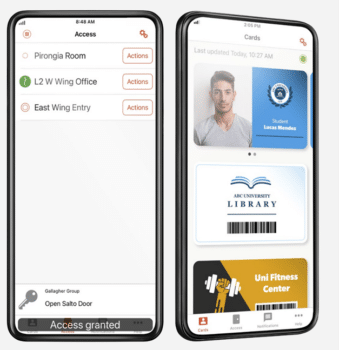 Vince also goes on to explain, “A door could be named doors, access points, portals, etc. in your existing system. We help our customers rename them in a way that end users operating the system will be able to quickly identify the physical location of any door. Of course, with larger sites there is more complexity. We work with the end user to create a site-specific nomenclature that is typically composed of literal door numbering, but also acronyms to codify and differentiate the different locations.”
Vince also goes on to explain, “A door could be named doors, access points, portals, etc. in your existing system. We help our customers rename them in a way that end users operating the system will be able to quickly identify the physical location of any door. Of course, with larger sites there is more complexity. We work with the end user to create a site-specific nomenclature that is typically composed of literal door numbering, but also acronyms to codify and differentiate the different locations.”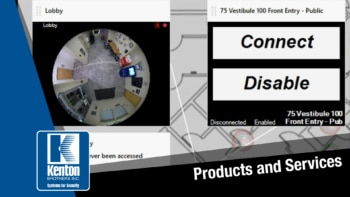 Access control is typically a Ho-Hum discussion. Who gets access to your doors? When during the day do they get access? Do you want pictures on your badges? What doesn’t get discussed often is how access control can make it easier to manage your facility. Ease of use is vastly different across access control platforms. Your decision on access control software can significantly affect how you manage your facility!
Access control is typically a Ho-Hum discussion. Who gets access to your doors? When during the day do they get access? Do you want pictures on your badges? What doesn’t get discussed often is how access control can make it easier to manage your facility. Ease of use is vastly different across access control platforms. Your decision on access control software can significantly affect how you manage your facility!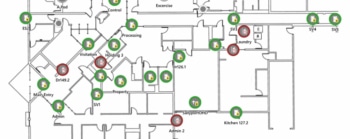
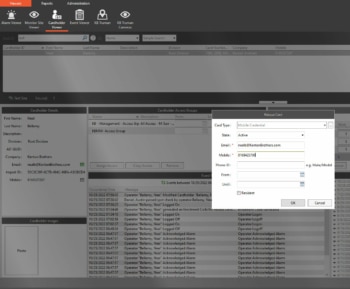



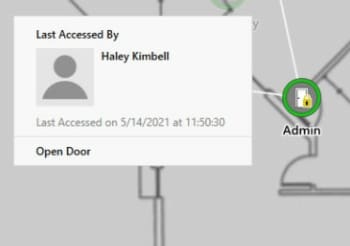
 There are reasons why you might want to increase security or safety by adding more features to your current access control system. Why? Copying and emulating an access card has become easier, due to new technology like a
There are reasons why you might want to increase security or safety by adding more features to your current access control system. Why? Copying and emulating an access card has become easier, due to new technology like a  Anti-passback is the access control term when we want to prevent someone from entering a door and then passing back the card to another person, who then uses the card to enter. Most access control systems have that technology available. When this feature is enabled, you also know when a person is leaving the area. If you know when they are in the area and you know when they leave an area, then you also know where they shouldn’t appear in the building. In other words, if the cardholder is already in the building, you should not grant access to the building again.
Anti-passback is the access control term when we want to prevent someone from entering a door and then passing back the card to another person, who then uses the card to enter. Most access control systems have that technology available. When this feature is enabled, you also know when a person is leaving the area. If you know when they are in the area and you know when they leave an area, then you also know where they shouldn’t appear in the building. In other words, if the cardholder is already in the building, you should not grant access to the building again.